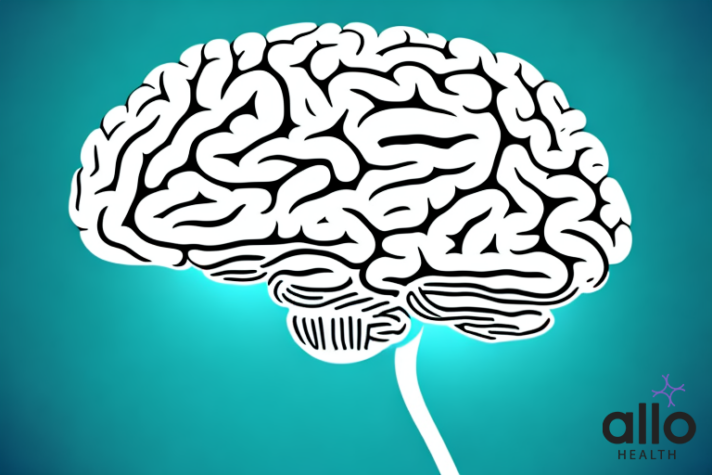Understanding the Sexual Side Effects of Doxepin

Allo Health is dedicated to personalized well-being, offering support and trusted information tailored to individual health goals. The platform emphasizes human-generated content, led by a distinguished medical team of experts, including physicians and sexual health specialists. Their commitment to credibility involves rigorous fact-checking, authoritative research, and continuous updates to ensure accurate, up-to-date information. Allo Health's unique approach goes beyond conventional platforms, providing expert-led insights and a continuous commitment to excellence, with user feedback playing a crucial role in shaping the platform's authoritative voice.

Dr. Aditi completed her undergraduate medical education at AJIMS, Mangalore, after which she worked in multi-speciality hospitals with COVID patients and in the Pain and Palliative medicine department. Driven by her experiences, she developed a keen interest in psychiatry. Dr. Aditi believes that mental health is just as, if not more important, than physical health.
Why This Was Upated?
Our experts continually monitor the health and wellness space, and we update our articles when new information became available.
Updated on 08 December, 2023
- Article was updated as part of our commitment to diversity, equity, and inclusion.

"The following blog article provides information about a drug or brand name drug and its potential effects or benefits. However, it is crucial to understand that this information is intended for general educational purposes only and should not be considered a substitute for professional medical consultation. It is highly recommended to consult with a qualified healthcare professional before making any decisions regarding medication, treatment, or healthcare management.
Book consultation
Individuals have unique medical conditions, and the information provided in this article may not be applicable to everyone. Only a qualified healthcare provider can evaluate your specific medical situation, taking into account your medical history, conducting appropriate tests, and providing personalized advice and recommendations. They are equipped to make informed decisions tailored to your individual needs.
It is crucial to emphasize that self-diagnosis, self-medication, or disregarding medical advice can have serious health consequences. This article may reference specific brand names or drugs for illustrative purposes. Mention of these names does not imply endorsement, recommendation, or guarantee of their efficacy or safety. The choice of medication should be based on discussions and individualized guidance from a healthcare professional who has a comprehensive understanding of your medical condition.
"Doxepin is a tricyclic antidepressant used to address conditions like anxiety, depression, and insomnia. This medication operates on the central nervous system, regulating certain brain chemicals. Understanding its uses and potential effects especially on sexual health is crucial for safe and effective treatment.
What is Doxepin?
- Doxepin is a tricyclic antidepressant utilized in the treatment of conditions such as anxiety, depression, and insomnia.
- It functions by affecting certain chemicals in the brain and central nervous system.
- This medication is available only with a doctor’s prescription.
Uses of Doxepin
- Treatment of Depression: Doxepin is employed to alleviate symptoms of depression. It works by regulating neurotransmitters in the brain, helping to improve mood and restore emotional balance.
- Anxiety Disorders: This medication is also effective in managing certain anxiety disorders. It helps in reducing excessive worry, nervousness, and restlessness, allowing individuals to regain a sense of calm.
- Insomnia Relief: Doxepin is employed in low doses to treat insomnia. By affecting brain chemicals, it aids in initiating and maintaining sleep, which is crucial for individuals struggling with sleep disturbances.
- Chronic Urticaria: Doxepin has been found to be beneficial in treating chronic urticaria, a skin condition characterised by persistent hives. It helps in reducing itching and discomfort associated with this condition.
- Off-Label Uses: In some cases, Doxepin may be prescribed for off-label uses such as pain management, migraines, and certain types of neuropathic pain. It can be particularly useful in cases where conventional treatments have proven ineffective.

Potential Side Effects
- Sedation and Drowsiness: Doxepin may cause drowsiness, especially during the first few days of treatment. It is advisable to avoid activities requiring mental alertness, such as driving or operating heavy machinery, until the effects are known.
- Dry Mouth: A common side effect, doxepin may lead to reduced saliva production, resulting in a dry mouth sensation. Staying hydrated and using sugar-free candies or gum can help alleviate this discomfort.
- Constipation: Some individuals may experience a decrease in bowel movements while taking doxepin. Maintaining a balanced diet rich in fiber and staying adequately hydrated can help mitigate this effect.
- Blurred Vision: Doxepin may cause temporary visual disturbances. It’s crucial to inform your healthcare provider if you experience any changes in vision while on this medication.
- Urinary Retention: In rare cases, doxepin can lead to difficulty in urination. If you experience this symptom, consult your doctor promptly.
- Weight Gain: Some individuals may notice an increase in weight while taking doxepin. Maintaining a healthy lifestyle with regular exercise and a balanced diet can help manage weight.
- Changes in Sexual Desire or Function: Doxepin can affect sexual desire and performance in some individuals. Open communication with your healthcare provider is important if you experience any related concerns.
- Increased Heart Rate: In rare cases, doxepin may lead to an elevated heart rate. If you experience palpitations or any concerning changes in heart rhythm, seek medical attention promptly.
- Skin Reactions: Although uncommon, some individuals may experience skin reactions like rash or itching. Notify your healthcare provider if you observe any unusual skin changes.
- Mood Changes: In rare instances, doxepin may cause mood swings or changes in behaviour. If you experience significant shifts in mood, inform your health care provider promptly
The severity of these side effects can vary based on factors such as the prescribed dosage of doxepin by your healthcare professional.
Sexual Side Effects of Doxepin
- Decreased Libido: Some individuals taking Doxepin may experience a reduction in sexual desire or interest.
- Erectile Dysfunction: Doxepin can, in some cases, lead to difficulties achieving or maintaining an erection in males.
- Delayed Ejaculation: A subset of individuals may find that achieving orgasm takes more time or effort while using Doxepin.
- Anorgasmia: This refers to the inability to achieve orgasm, even with sufficient stimulation. It is a potential side effect of Doxepin.
- Changes in Sexual Arousal: Some individuals may notice alterations in their physiological responses to sexual stimuli.
Dosage and Safety Instructions
- Dosage: The appropriate dose of Doxepin varies depending on the specific condition being treated. For depression or anxiety in adults and children over 12 years, the initial dose is typically 75 milligrams (mg) once daily, which may be adjusted by your doctor. The dose usually does not exceed 150 mg per day. For insomnia, adults typically take 6 mg once daily.
- Administration: Take Doxepin as prescribed by your doctor. For the Sinequan® oral liquid or capsule, it can be taken at bedtime, while the Silenor® tablet should be taken 30 minutes before bedtime. Ensure you have a full 7 to 8 hours available for sleep.
- Avoid Monoamine Oxidase (MAO) Inhibitors: Do not take Doxepin if you have used an MAO inhibitor within the past 2 weeks, as it can lead to serious complications.
- Pregnancy and Breastfeeding: Pregnant women or breastfeeding mothers should discuss with a health professional before consumption of Doxepin. Doxepin may have effects on the baby, and alternatives should be considered.
- Driving and Operating Machinery: Be cautious as Doxepin may cause drowsiness. Assess your reaction before engaging in activities that require alertness such as operating dangerous machinery.
- Alcohol and CNS Depressants: Avoid alcohol and other central nervous system depressants while taking Doxepin, as they can intensify its effects.
- Regular Check-ups: Attend regular check-ups with your doctor to monitor progress, adjust dosage if needed, and address any concerns.
- Suicidal Thoughts: In some individuals, especially children, teenagers, and young adults, Doxepin can increase suicidal thinking. Contact your doctor immediately if you notice any changes in mood or behavior.
- Storage: Store in a closed container at room temperature, away from heat, moisture, and direct light. Keep out of the reach of children.

Drug Interactions
- Avoid These Medicines: Certain medicines should not be used in conjunction with Doxepin. These include Bepridil, Bromopride, Cisapride, Dronedarone, Grepafloxacin, Linezolid, Methylene Blue, Pimozide, Potassium Citrate, Saquinavir, Terfenadine, and others. Always inform your doctor about all medications you are taking.
- Use with Caution: Some medicines, while generally not recommended with Doxepin, may be required in specific cases. If both medicines are prescribed together, your doctor may adjust the dosage or frequency of one or both medications. Examples include Acenocoumarol, Carbamazepine, Phenprocoumon, and Warfarin, among others.
- Alcohol and CNS Depressants: Doxepin’s effects can be intensified when taken with alcohol or other central nervous system depressants. This category includes sedatives, tranquilizers, prescription pain medicine, muscle relaxants, and anesthetics.
- Other Medical Conditions: Inform your doctor about any other medical conditions you have, especially bipolar disorder, breathing problems, psychosis, sleep apnea, glaucoma, urinary retention, or liver disease. They may require special consideration when using Doxepin.
- MAO Inhibitors: Do not take Doxepin if you have taken a monoamine oxidase inhibitor within the past two weeks. This can lead to serious complications.
Key Takeaways
- Doxepin, a tricyclic antidepressant, is used for anxiety, depressive disorder, and insomnia by affecting brain chemicals and the central nervous system.
- It’s crucial to understand its uses and potential adverse effects on sexual health for safe and effective treatment.
- Doxepin treats depression by regulating neurotransmitters, helps manage anxiety disorders, and aids in insomnia relief.
- It’s also beneficial for chronic urticaria and can be used off-label for pain, migraines, and certain neuropathic conditions.
- Common side effects include sedation, dry mouth, constipation, blurred vision, and potential weight gain.
- Sexual side effects may include decreased libido, erectile dysfunction, delayed ejaculation, anorgasmia, and changes in sexual arousal.
- Dosage varies based on the condition, and precautions include avoiding MAO inhibitors, discussing pregnancy/breastfeeding, and being cautious with alcohol and CNS depressants.
- Regular check-ups with a health care professional is essential, especially for those with suicidal thoughts. Store Doxepin properly and be aware of potential drug interactions.
Frequently Asked Questions
Q: Does Doxepin cause extrapyramidal symptoms?
A: No, Doxepin is not known to cause extrapyramidal symptoms. It primarily affects neurotransmitters in the brain and central nervous system without impacting the motor control functions associated with extrapyramidal symptoms.
Q: Can Doxepin cause dilated pupils?
A: Yes, Doxepin can potentially cause dilated pupils, although this is considered an uncommon side effect. If you experience this, it’s important to consult your healthcare provider for further evaluation and guidance.
Q: What are the side effects of Doxepin?
A: Common side effects of Doxepin may include sedation, dry mouth, constipation, and blurred vision. Less frequently, it can lead to urinary retention, cold sweats, weight gain, chest pain, changes in sexual desire or function, increased heart rate, skin reactions, disturbed concentration and mood changes. It’s crucial to consult your healthcare provider if you experience any concerning symptoms while taking this medication.
Q: Can Doxepin cause abnormal behavior?
A: In rare instances, Doxepin may lead to mood swings or changes in behavior. If you notice significant shifts in mood or behavior while taking this medication, it’s important to inform your doctor promptly for further evaluation and guidance.






































